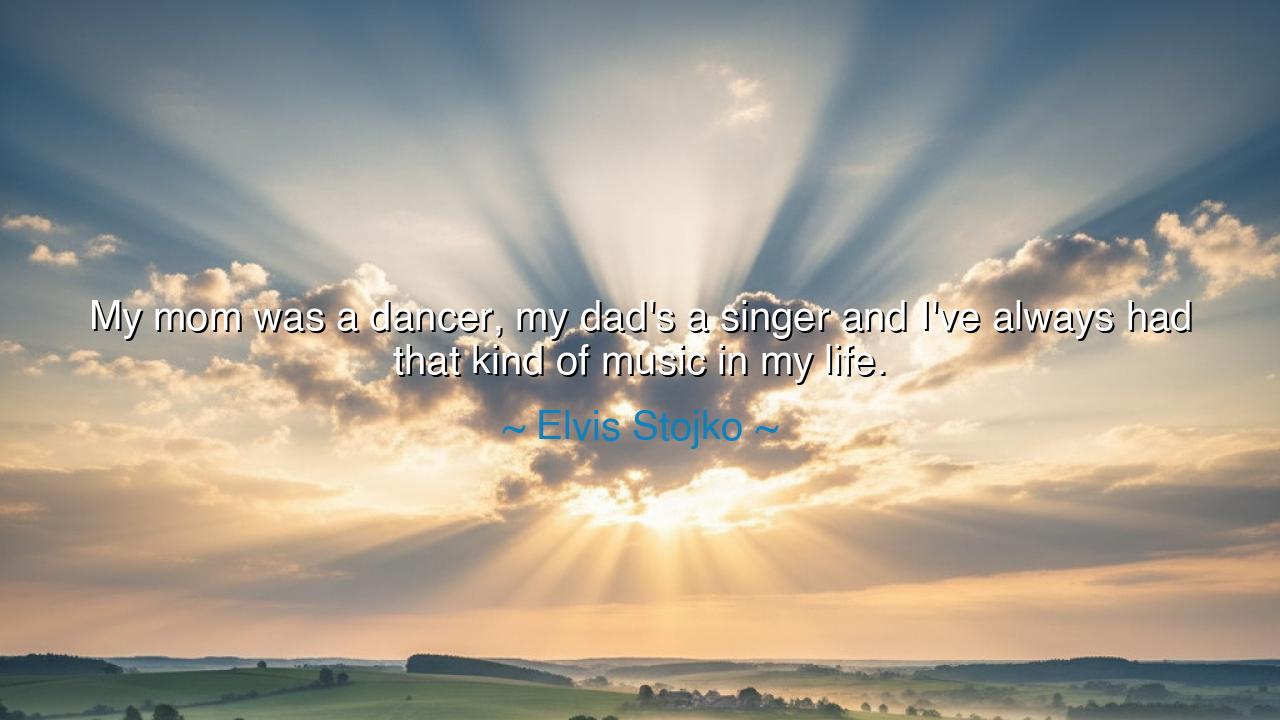
My mom was a dancer, my dad's a singer and I've always had that
My mom was a dancer, my dad's a singer and I've always had that kind of music in my life.






In the words of Elvis Stojko, “My mom was a dancer, my dad’s a singer, and I’ve always had that kind of music in my life.” Here we glimpse a truth that has echoed since the dawn of humanity: that we are the children not only of flesh, but of heritage, of rhythm and song, of stories sung and movements carried across generations. A man is not born from silence—he is born into a chorus, a harmony of voices, gestures, and traditions that shape his spirit before he learns to speak.
The dancer brings grace, the living poetry of the body, an art of silence that nevertheless roars. The singer carries the resonance of the soul, weaving sound into memory, giving voice to what words alone cannot hold. When these two currents flow into a single child, he grows in a house where even the walls know rhythm, where each heartbeat becomes a drum, and each breath a verse. Stojko, who would rise to greatness on the ice, shows us that his strength was not born merely from training or ambition—it was born of the music that surrounded his earliest days, filling him with invisible wings.
Think of the youth Alexander, who would one day be called the Great. As a boy, he was nurtured by his teacher Aristotle, who planted in him the seeds of philosophy and science, but also by his mother Olympias, who filled his ears with tales of heroes and gods. It was not only the discipline of war that made him mighty, but the melody of these influences, the chorus of knowledge and story, that shaped his destiny. Just as Alexander’s greatness was woven from the threads of family and teaching, so too Stojko’s artistry was born from the dance of his mother and the song of his father.
There is a secret here: that greatness rarely springs alone, like a solitary flame in the night. Rather, it is passed like a torch from hand to hand. The arts of our parents, the wisdom of our elders, the passions of those who came before us—all are inheritances more valuable than gold. They are not possessions we own, but energies we embody. In Stojko’s case, the music in his life did not compel him to be a dancer or a singer; instead, it taught him rhythm, expression, and courage, qualities that found their home upon the skating rink.
How often do we forget this truth, believing ourselves to be isolated, self-made islands? Yet when a child sings, is it not with the voice of generations echoing through? When one moves in rhythm, is it not the footsteps of countless ancestors that guide their stride? The music of life is never ours alone—it is the symphony of blood, memory, and shared humanity.
But let us not deceive ourselves: inheritance is not destiny. It is only a seed. A seed must be watered by discipline, sunlight, and courage to grow into a tree. Many inherit music, but few choose to carry it into the world. Stojko did not merely receive; he labored, he fought, he sacrificed, until the whispers of song and dance in his veins became a triumphant roar upon the stage of history.
And so, dear listener, take this lesson: cherish the gifts you have received, whether from parents, teachers, or the simple traditions of your people. Do not let them lie dormant. Ask yourself: what rhythm did I inherit? What melody runs through me? Perhaps your parents gave you laughter, or resilience, or the courage to endure hardship. These too are songs. These too are dances.
Practical action must follow wisdom. Look within your family and past, and name one inheritance—not of wealth, but of spirit—that you carry. Then, nurture it with intention. If your inheritance is song, then sing without fear. If it is compassion, then let it move your hands to heal. If it is courage, then face what others flee. In this way, you will not only honor those before you—you will also leave your own music for those yet to come.






AAdministratorAdministrator
Welcome, honored guests. Please leave a comment, we will respond soon